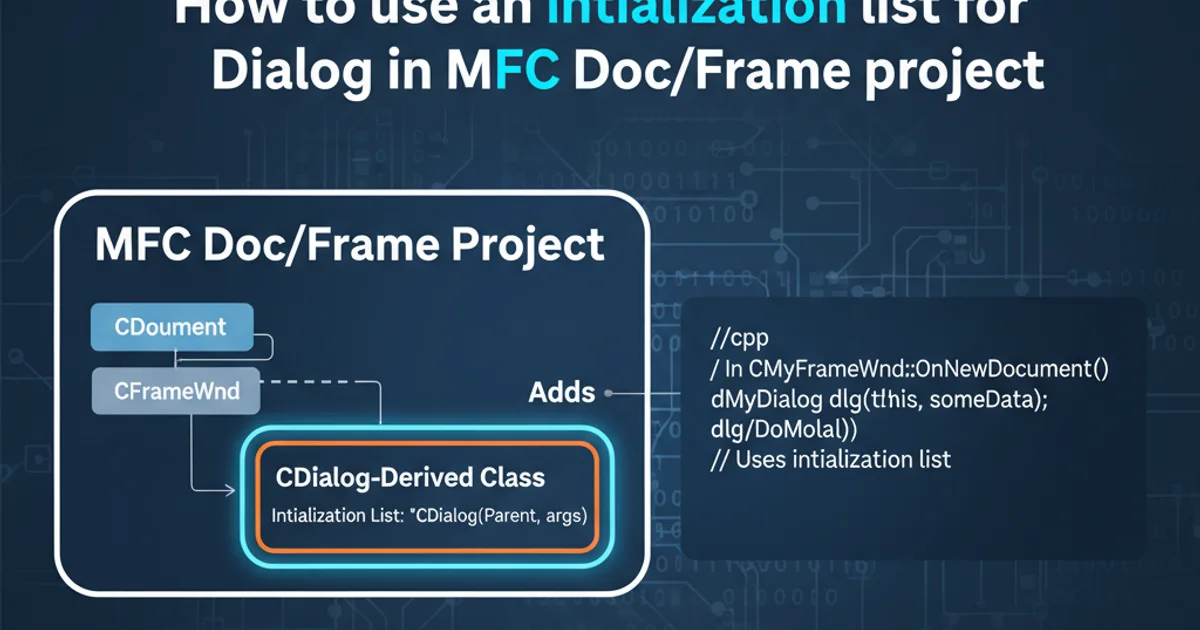How to use a initialization list for Dialog that is added to MFC Doc/Frame project
Categories:
Initializing MFC Dialogs in Doc/Frame Applications with Member Initializer Lists

Learn how to properly initialize member variables of an MFC dialog when it's part of a Document/View or Frame-based application, leveraging C++ member initializer lists for robust construction.
When developing MFC applications, especially those built on the Document/View or Frame architecture, you often need to integrate custom dialogs. A common challenge arises when these dialogs contain member variables that require specific initialization, particularly when the dialog is created dynamically or as part of a larger object. This article focuses on using C++ member initializer lists to ensure your MFC dialog's member variables are correctly and efficiently initialized, avoiding common pitfalls associated with default constructors or late initialization.
Understanding the MFC Dialog Lifecycle
Before diving into initialization, it's crucial to understand how MFC dialogs are typically created and managed within a Doc/Frame application. Unlike simple standalone dialogs, those integrated into a larger MFC framework often have their lifetime managed by the document or view, or are created in response to user actions within the frame. The standard process involves creating an instance of your CDialog-derived class, potentially passing parameters to its constructor, and then calling DoModal() to display it. The key is to ensure that any data the dialog needs to operate on is available and correctly set up before DoModal() is called, and ideally, during the object's construction.
flowchart TD
A[User Action (e.g., Menu Click)] --> B{Create Dialog Object};
B --> C{Call Dialog Constructor};
C --> D["Member Initializer List (Initializes members)"];
D --> E["CDialog::OnInitDialog() (Populates controls)"];
E --> F{Dialog Displayed via DoModal()};
F --> G{User Interacts with Dialog};
G --> H{Dialog Closed (e.g., OK/Cancel)};
H --> I{Dialog Object Destroyed};
I --> J[End];MFC Dialog Creation and Initialization Flow
The Role of Member Initializer Lists
A member initializer list is a C++ feature that allows you to initialize class members directly when an object is constructed, rather than assigning values within the constructor's body. This is particularly important for:
constmembers: These must be initialized at construction and cannot be assigned later.- Reference members: Similar to
constmembers, references must be bound at initialization. - Objects without default constructors: If a member object doesn't have a default constructor, it must be explicitly initialized.
- Efficiency: For complex objects, direct initialization can be more efficient than default construction followed by assignment.
When your MFC dialog needs to receive data from its parent (e.g., the document or view) upon creation, passing this data through the constructor and using an initializer list is the most robust and idiomatic C++ approach.
// MyDialog.h
#pragma once
#include "afxdialogex.h"
class CMyDialog : public CDialogEx
{
DECLARE_DYNAMIC(CMyDialog)
public:
// Constructor with initializer list
CMyDialog(CWnd* pParent = nullptr, int initialValue = 0, CString initialText = _T(""));
virtual ~CMyDialog();
enum { IDD = IDD_MY_DIALOG }; // Replace IDD_MY_DIALOG with your dialog's ID
protected:
virtual void DoDataExchange(CDataExchange* pDX);
virtual BOOL OnInitDialog();
DECLARE_MESSAGE_MAP()
private:
int m_nValue;
CString m_strText;
};
// MyDialog.cpp
#include "stdafx.h"
#include "YourApp.h" // Replace YourApp.h with your application's header
#include "MyDialog.h"
IMPLEMENT_DYNAMIC(CMyDialog, CDialogEx)
// Constructor implementation using initializer list
CMyDialog::CMyDialog(CWnd* pParent /*=nullptr*/, int initialValue, CString initialText)
: CDialogEx(CMyDialog::IDD, pParent) // Call base class constructor
, m_nValue(initialValue) // Initialize m_nValue
, m_strText(initialText) // Initialize m_strText
{
// Constructor body can perform additional setup if needed
}
CMyDialog::~CMyDialog()
{
}
void CMyDialog::DoDataExchange(CDataExchange* pDX)
{
CDialogEx::DoDataExchange(pDX);
DDX_Text(pDX, IDC_EDIT_VALUE, m_nValue); // Replace IDC_EDIT_VALUE with your control ID
DDX_Text(pDX, IDC_EDIT_TEXT, m_strText); // Replace IDC_EDIT_TEXT with your control ID
}
BOOL CMyDialog::OnInitDialog()
{
CDialogEx::OnInitDialog();
// TODO: Add extra initialization here
// The member variables m_nValue and m_strText are already initialized here
// You can use them to set control values, e.g.:
// SetDlgItemInt(IDC_EDIT_VALUE, m_nValue);
// SetDlgItemText(IDC_EDIT_TEXT, m_strText);
return TRUE; // return TRUE unless you set the focus to a control
// EXCEPTION: OCX Property Pages should return FALSE
}
BEGIN_MESSAGE_MAP(CMyDialog, CDialogEx)
END_MESSAGE_MAP()
Example of an MFC Dialog with a Constructor Using an Initializer List
Integrating the Dialog into a Doc/Frame Project
Once your dialog class is set up with a proper constructor, you can instantiate and use it within your MFC Doc/Frame application. Typically, you'll create an instance of the dialog class in a view, document, or even the main frame class, passing the necessary data. The DoModal() call will then display the dialog, and upon its return, you can retrieve any modified data.
// In a CView-derived class (e.g., CYourAppView.cpp)
void CYourAppView::OnShowMyDialog()
{
// Get data from the document or view to pass to the dialog
CYourAppDoc* pDoc = GetDocument();
ASSERT_VALID(pDoc);
int currentDocValue = pDoc->GetCurrentValue(); // Example: get data from document
CString currentDocText = pDoc->GetCurrentText(); // Example: get data from document
// Create an instance of the dialog, passing initial values to its constructor
CMyDialog dlg(this, currentDocValue, currentDocText);
// Display the dialog modally
if (dlg.DoModal() == IDOK)
{
// If the user clicked OK, retrieve the updated values from the dialog
// Note: DDX_Text and DDX_Int in DoDataExchange will have updated dlg.m_nValue and dlg.m_strText
// after DoModal() returns and before the dialog object is destroyed.
int updatedValue = dlg.m_nValue;
CString updatedText = dlg.m_strText;
// Update the document with the new values
pDoc->SetCurrentValue(updatedValue);
pDoc->SetCurrentText(updatedText);
pDoc->UpdateAllViews(nullptr);
}
// If the user clicked Cancel, no action is needed as the dialog's members are discarded
}
Calling the Dialog from an MFC View
CWnd* pParent to your dialog's constructor. This ensures the dialog has a proper parent window, which is important for message routing and ownership. In a view, this (the view itself) is a suitable parent.OnInitDialog() that might block the UI thread. For heavy data loading, consider using worker threads or deferred loading mechanisms.